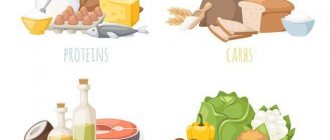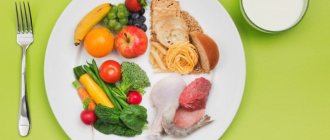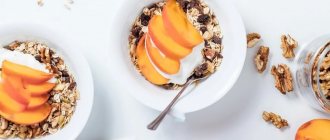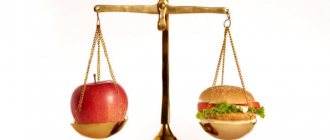For those who have not encountered the rules of healthy eating, everything may seem very complicated. But in fact, once you start, proper nutrition will become a habit and will not be a burden at all.
If we talk about families, the presence of small children is the main incentive to start eating right. After all, it is in the family that the basic views on life and correct behavior are laid.
In this article we will talk about how you can accustom your household to proper nutrition and not experience discomfort from the process of preparing and eating such food.
Eating right today...
Proper nutrition is one of the fundamental factors of healthy and complete human development.
What and how we eat greatly influences our entire lives. Issues of healthy nutrition become especially relevant when a small child appears in the family. To paraphrase the famous statement of Arkady Gaidar, we can say with confidence: “Everyone understands what “proper nutrition” is in their own way.” In most cases, ideas about healthy food are associated with our family eating habits, national traditions, lifestyle, as well as with the principles of attitude towards our health. A “reconsideration of values” almost always occurs when a small child appears in the family. What should you pay attention to?
Where do milk rivers originate?
At the very beginning of this special issue, we already drew your attention to the fact that it is not for nothing that breast milk is called the elixir of health, the main food for babies, and the best medicine for children. Mother's milk contains immune antibodies that protect the baby from pathogenic viruses and bacteria, fatty acids necessary for the development of the brain and nervous system, as well as a large amount of immunoglobulin A, which prevents the occurrence of allergies. Infants are less likely to suffer from diarrhea, respiratory diseases, and middle ear infections due to the anti-infective factors of human milk (leukocytes, lactoferrin, etc.). Mother's milk is the most correct, ideal nutrition for a baby, because it contains all the necessary substances in an ideal combination. And for mothers, breastfeeding is very, very beneficial - both in terms of women’s health and emotionally. But there is another important point: it is during pregnancy that the family principles of rational, proper nutrition are laid down, and during the period of breastfeeding, continue to be instilled. The most balanced and vitamin-rich menu is almost always for pregnant and nursing mothers.
Conclusion: it is very important to “infect” all members of your family (that is, your husband and older children) with the correct attitude towards nutrition during pregnancy and breastfeeding.
As a young mother, you simply won’t have enough time, energy and money to cook several different dishes at the same time. It is convenient to adhere to the principle “everything ingenious is simple”: all complex, multi-component dishes are usually quite difficult for the stomach and intestines.
Important points
1. If your family doesn’t like salty foods, then it’s easier to add salt to everyone’s taste on their plate. The same applies to spices.
2. If someone has certain preferences, respect them. If your spouse is a vegetarian, prepare plant-based meals for him. But this does not deprive you of the right to eat your favorite foods, including meat and fish.
3. Do not impose your favorite, and possibly very healthy and healthy dishes. Offer, but don't insist. Every person, child or adult, has the right to choose.
4. Coordinate the menu. Expand your food horizons - buy cookbooks and magazines, watch cooking programs. Prepare new dishes.
What do you think, ladies and gentlemen?
In your opinion: What place should food have in family life, and in any life? Answers to questions about food and nutrition >>>>
"Adult" agreements.
Before you begin systematic work on transferring your own family to proper and healthy nutrition, you need to dot all the i’s. The most important thing is the unanimity of all adult family members, because, you see, not only small children need proper food. Moreover, the attempts of one parent to pursue their line, not supported by the other, will generally turn out to be absolutely empty and useless. Let’s say you offer your child muesli with juice or natural yogurt for breakfast, and dad eats scrambled eggs with onions and bacon every morning, and also snacks on sandwiches, giggling at your “healthy” diet... Will you achieve more success? Or, when there is an official ban on chips in the family, the grandmother still quietly buys them for the “poor girl who is forbidden from everything” almost every day... Will the little girl refuse such a wonderful delicacy? Of course not! She won’t refuse, and she’ll also thank grandma for treating her... Remember: children from a very early age understand perfectly well that action is much clearer than any words. You can convince your child as much as you like that sweet carbonated water is harmful, but if at the same time you drink it yourself, and often, the result of your conversations will be zero. With this option, the baby will understand that since they don’t give him food, but eat it themselves, it means that he is being deprived of something. And the baby will begin to perceive “bad” food as a sign of adulthood, a world that must be accessed. Needless to say that a child will always strive to enter this world inaccessible to him? Therefore, first agree with all adults in the family on common “rules of food” and then try to adhere to them. Moreover, it will be useful and very useful for everyone: both adults and children. Proper nutrition is the key to good health and well-being, no matter how trite it sounds, but it is true.
The usual set of products in the Nikitin family (60-80s), prices are approximate
Milk, 1 liter (on tap) - 28 kopecks. We bought it almost every day - a 4 liter can. They drank it unboiled.
Sour cream, 1 kg - 1 rub. 70 kopecks We bought it in a special plastic can for 1.5 kg.
Cottage cheese, 1 kg - low-fat 85 kopecks, regular 1 rub.
Eggs, 1 des. - 90 kopecks. and 1 rub. 30 kopecks
Butter, 1 kg - 3 rubles. 50 kopecks
Cheese “Poshekhonsky”, “Dutch”, 1 kg - 2 rubles. 70 kopecks, “Russian” - 3 rubles. We bought regularly.
Bread:
- rye, 1 loaf - 12 kopecks;
- wheat (gray), 1 loaf 0.8 kg - 15 kopecks;
- white wheat, 1 loaf (brick) 0.8 kg - 22 kopecks.
Bagel - 6 kopecks. (occasionally brought from Moscow, everyone got a quarter or a half).
Gingerbread cookies, 1 kg - 1 rub. Loved it very much and bought it often.
Granulated sugar, 1 kg - 90 kopecks. It took a lot.
Potatoes, 1 kg - 10-12 kopecks. Carrots, beets - 15-20 kopecks.
Buckwheat, 1 kg - 55 kopecks. (but there was almost none in stores), round rice - 88 kopecks. Pasta, I think, 33 kopecks. per kilogram.
Jonathan apples 1 kg - 1 rub. 50 kopecks
In the garden there were gooseberries, raspberries, some strawberries, dill and parsley, carrots, sorrel, radishes, apples, cherries, and plums. In the area under the pine trees there are strawberries and blueberries. But everything grew poorly in the garden and vegetable garden, since the pine and spruce trees blocked the sun. At one time we planted potatoes ourselves.
Important principles.
♦ Consistency in approaches is also very important, not only to specific products, but also to the proper nutrition system as a whole. Let's say you think that drinking soup and a second drink with compote during lunch is harmful. Or that it is advisable not to eat a sweet dessert immediately after the main meal. By evening, your views on this problem should not change.
♦ Try to avoid fundamental extremes (by the way, this is relevant not only for problems related to food). Even if the issues of proper nutrition have always been very important for you, you should not automatically transfer to your child the principles of vegetarianism, raw food diet, separate nutrition, nutrition according to blood type, and especially a variety of fashionable diets (to be honest, we know: some mothers are addicted to this is very active). Children's nutritionists and pediatricians never tire of reminding parents that the digestive tract and many other systems of a child's body function differently than those of an adult. For the harmonious construction of the bone skeleton, nervous system, for proper weight gain, etc., a small child needs, for example, much more fat (both plant and animal) than his parents, in percentage terms, of course. This does not mean at all that a five-year-old toddler should eat half a stick of butter a day, far from it. However, you should be very aware that oil, both vegetable and butter, must be present in his diet. The lack of animal proteins in the diet (beef, veal, chicken, etc.) must be compensated for by a well-thought-out amount of plant proteins (beans, lentils, peas, etc.). But if your baby has low hemoglobin, significant weight loss and some other symptoms, you will have to adjust his diet, and not just select the appropriate medications.
♦ Whatever “proper” nutrition plan your family follows, variety in the family diet is very important. There is no need to buy different types of sausage; this, of course, is not what we’re talking about. But “sitting” on just kefir or green apples is also a certain extreme. Remember that each fruit, especially those grown in its native land, contains a unique set of vitamins and other useful substances, and each fermented milk product (ryazhenka, acidophilus, and yogurt) is “responsible” for its own part of the work to improve the health of our intestines.
Conclusion: proper nutrition is not an end in itself, it is simply a way of existence.
And if you live in a family, then it’s easier and better when the same rules exist for everyone: take your children shopping at grocery stores, consulting with them, teach them how to prepare salads from fresh vegetables and cut cheese, discuss a sample menu for tomorrow.
Eating healthy for the whole family is not as difficult as it seems
Only some people can quickly switch the whole family to a different diet: either they manage to come to an agreement, or all family members have nothing against it - they would have accepted the changes earlier if the owner of the house had thought to introduce these changes.
But for most people, rapid change is not acceptable, so if you want to achieve positive results, you will have to be patient. Many people are prevented from making a decision by common misconceptions or rumors that proper nutrition is boring, and natural products are expensive and tasteless. As soon as the topic of usefulness comes up, these people begin to grin or make excuses, and women repeat that their children and husbands “won’t eat it,” but in fact they simply don’t know anything about it, and they don’t know how to cook, although they think themselves as excellent housewives.
Proper nutrition, first of all, means that you need to use fresh and varied products, and prepare meals yourself, rather than buying ready-made food in the store - this will already improve the health and well-being of the whole family. And if you eat these dishes in reasonable quantities, and at the time when necessary, everything will improve even faster, but the hostess will have to take care of all this, and this can take - depending on the “spoiledness” of all family members - not one month, but even more than one year.
Expensive delicacies are not needed: we just need to pay attention to those products that we had not noticed before and did not know what could be cooked from them - after all, most Russian families eat the same. For example, lentils, asparagus, broccoli, rabbit meat - we buy these products less often than sausage or canned food, because we think that dishes made from them will be tasteless or unusual. Using new products, and many of those that we bought before, we can learn to cook many dishes - you can experiment as much as you like, and combine fats, proteins and carbohydrates with plenty of fresh vegetables, fruits and herbs. Also, the diet should always include fresh eggs, fish and meat, animal fats and vegetable oils, dairy products, cereals, nuts and honey.
Gradually, you can learn to cook food in healthy ways: not fry, but bake; do not cook in boiling water, but steam, and generally subject foods to minimal heat treatment - besides, these methods also save time.
Try to buy not exotic products, but local ones, but not out of a sense of patriotism, but simply because they are fresher and healthier. And the fact that they are also cheaper should be a pleasant “bonus”.
Regularity
Recommendations for strict adherence to a diet are not just a whim of nutritionists. The natural need to consume food regularly is determined by the activities of the human body itself. All our internal processes (breathing, heartbeat, cell division, digestive system) are rhythmic. The diet ensures an even load on the digestive system, that is, there should be at least 4 meals a day.
Eating “by the clock” is beneficial at any age, but its importance is especially great for children and adolescents. The body is actively growing, and irregular nutrition is extra stress and fertile ground for the development of health problems. Children in the family must be taught to eat according to a schedule, so they will not have to waste energy on unjustifiably unnecessary life processes.
Diversity
Our body constantly needs a variety of energy materials. We simply must get proteins, carbohydrates, fats, vitamins and minerals from food. Each of the listed substances has its own functions. A lack of any of the components leads to malfunctions in the functioning of the entire body.
If there are children in the family, it is important to give them a varied taste horizon. A child should love different foods and different dishes. Then in adulthood it will be easy for him to properly organize his nutrition. The family’s diet must include products from all groups - meat, fish, dairy, and always plant-based.
What foods are healthy?
There are products whose usefulness no one doubts. In addition, it is advisable to use optimal methods of preparing dishes - boiling, stewing, baking (gentle heat treatment).
Fresh vegetables, fruits, garden herbs, sprouted grains - this is a unique balanced set of vitamins (primarily group B, C and provitamin A (beta-carotene)) and microelements (potassium, phosphorus, calcium, magnesium); This is plant fiber that helps improve intestinal motility and absorbs various toxins, bacteria, and infectious agents, removing them from the body. Vegetable protein is also important, as it has a different nutritional value than animal protein. According to pediatricians and children's nutritionists, frozen vegetables, fruits and berries are very healthy and easy to use. But only on the condition that all storage rules have been followed. Give preference to so-called “quick-frozen” products, that is, sharply cooled within two hours after assembly. This treatment helps preserve vitamins as much as possible. Be careful with the exotic - mango, kiwi and papaya are not suitable for every average Ukrainian.
Fermented milk products are rich in vitamins and microelements. The daily diet of all family members should include a choice of cottage cheese, kefir, fermented baked milk, yogurt, live yogurt, and cheese. By the way, all of the listed fermented milk products have a different “composition” (yogurts are prepared using strains of the Bulgarian bacillus, kefir - using a special starter, etc.). A very important point: buy fermented milk products with a shelf life limited to a few days, that is, “live” and not heat-treated, and only from refrigerated display cases!
Whole grains. There is a big difference between whole and processed (refined) grains. More than two dozen components important for human health are lost during the refining process. If cereals are made from whole grains, this will serve as the basis for a healthy diet for every family member. Grains and cereals are needed not only for making bread (the most useless is soft wheat), porridge (buckwheat, oatmeal, corn, barley), but also side dishes (rice, buckwheat), muesli (oatmeal and corn flakes for breakfasts and snacks). When choosing pasta, give preference to durum wheat.
Dried fruits are useful for everyone; it is very convenient to use them instead of sweets and marmalade and for snacks, or add them to porridge and muesli. In terms of the set of microelements and vitamins, dried apricots differ from prunes, and figs differ from dried cherries, so it is good to use the maximum range of these healthy products in your diet. Particular attention should be paid to the quality of drinking water. It is not for nothing that water is considered the basis of life: every person should drink ordinary water. Other liquids (soups, juices, fruit drinks, tea) should also be in the diet.
Recipes
Vegetable stew. You will need:
- potatoes - 4 pcs;
- carrots - 1-2 pcs;
- onion - 1 piece;
- zucchini - 1 piece;
- white cabbage - 300 g;
- vegetable oil;
- water - 300 g;
- salt.
Peel all vegetables and cut into small cubes, place in a thick-bottomed saucepan or multicooker, add water and simmer for 40 minutes, finally add 1-2 tbsp. vegetable oil and salt, spices to taste.
Pea soup. Ingredients:
- dried peas - 350 g;
- potatoes - 300 g;
- carrots - 1 piece;
- onion - 1 piece;
- beef - 300 g;
- water - 3 l.
Pre-soak the peas for 3-4 hours, then drain the old water, add fresh water and place on the stove. When the cereal boils, remove the foam, add salt and reduce the heat by half. Leave to cook for 1-1.5 hours, then add the beef cut into pieces, cook for another 40 minutes.
Peel the vegetables, cut into cubes and add to the pan, cook for 20 minutes, at the end of cooking add bay leaf and sweet peas. You can add 2-3 tablespoons of vegetable oil. Considering that the vegetables were not sautéed and the meat is lean, there will be no harm from such an amount of oil.
Fast food and company.
Perhaps the only food that does not raise doubts about its uselessness is fast food (“fast food”): products without cooking. So much has already been said about the dangers of such food, but to this day fast food establishments are thriving. Moreover, most often in their advertising campaigns they emphasize that these are family restaurants, implying that people come here to relax with children. I hope you understand that this is nothing more than an advertising campaign in order to attract visitors, a myth, a beautiful shell. There is also “junk” food - salted fried nuts, seeds, chips, crackers. It is naive to assume that “crackers are the same “Borodino bread”, only cut into cubes.” Carefully read the information on the packaging: a small amount of rye or wheat flour contains numerous flavoring additives identical to natural ones, excess salt, food coloring and flavor enhancers, which nullify all the beneficial properties of this very flour. Tasty? Maybe yes. Healthy? No. Don't forget to drink - sweet carbonated drinks in large quantities are dangerous for a child's health! They contain a huge amount of harmful dyes, taste enhancers and preservatives. It is important that the baby understands why this is harmful. After all, in a few years, having pocket money, he will choose what to buy - a bag of juice, mineral water or sweet soda. Even without discussing the features of the production of natural fruit juices or the quality of mineral water, it is clear that this option is still better than the third. The main thing is that the child makes the right choice on his own.
Personal opinion
Anastasia Stotskaya, singer:
– In the complex matter of losing weight, it is better to entrust yourself to a nutritionist who can advise a weight loss technique that is adequate for your body. For example, I once went on a complete fast. This is a powerful body cleansing procedure. For a week you don’t eat anything, but only drink water, in addition you get massages, enemas, and cleanse your liver. Seven days after this you come out of hunger - you drink jelly for two days, then add one product per day. Both psychologists and doctors worked with me at this time. After this torment, I not only gained weight, but also received a great charge of positive energy.
Bad eating habits of adults are passed on to children...
Imposing your preferences on a small child can be considered a kind of psychological “fast food”. First of all, this applies to sweetening and adding salt to food. Yes, we are so used to it, we were taught this way. But the baby’s taste is not formed at the time of birth, so he does not know what it means to be tasty. In our opinion, babies gobble up, in our opinion, bland and tasteless zucchini purees, pumpkin and unsweetened cottage cheese, natural yoghurts without fillers, etc. The later your child learns the taste of candy, the better for his health and development! Although it is also impossible to completely exclude sweets from the diet - glucose is involved in many chemical processes necessary for the development of the child’s body systems, including the brain. Natural sugars are found in most foods. especially in milk (lactose), fruits (fructose), vegetables, herbs. According to nutritionists, adding salt to food does not have any additional nutritional effect. The need for salt is a matter of habit. The approximate daily amount of table salt (sodium chloride) for children aged 1 to 3 years should be 4 grams, taking into account the salt contained in food (for example, vegetables have enough of their own healthy salt, as well as fruits - fruit sugar, fructose ), children under 7 years old - 5 grams. For adding salt, it is better to use iodized salt, and after cooking the dish: beneficial iodine is destroyed as a result of heat treatment. Sometimes “proper nutrition” is associated with undoubtedly healthy, but necessarily tasteless. Actually this is not true! In addition, no one can forbid you to go with your children to a café-pastry shop or restaurant and prepare something very unusual, sweet and airy for a family holiday.
Rarely purchased
Bread in loaves (1 loaf of 0.5 kg cost 25 kopecks). But we didn’t like it, the regular wheat one was tastier.
Sausage:
Dairy, 1 kg - 2 rubles. 20 kopecks “Doctor’s” and “Amateur” (with fat) - 2 rubles. 90 kopecks We bought them occasionally. “Krakovskaya” - 3 rubles. 60 kopecks
Bananas, 1 kg - 2 rubles, were a great delicacy. On holidays - 1 piece per brother.
Tongues - 7 kopecks, shortcakes - 8 kopecks, high-calorie bun - 10 kopecks. Cake - 22 kopecks. These things were practically not bought: they were given at school for breakfast or brought by guests.
Chocolate “Alenka” 100 g - 90 kopecks. She was very loved and rarely appeared. It was always divided into sticks of 5 squares. Each person gets one of these sticks. This was considered completely natural - look how big she was. Sweets were also usually divided: they received half.
Dried apricots, honey, and nuts were expensive and rare; they ate them a little at a time.
What never happened on the table:
- smoked meats, expensive sausages;
- ham, boiled pork, red fish (true, there were none for the common people).
We never bought mayonnaise, ketchup, sauces, and very rarely cakes and sweets.











